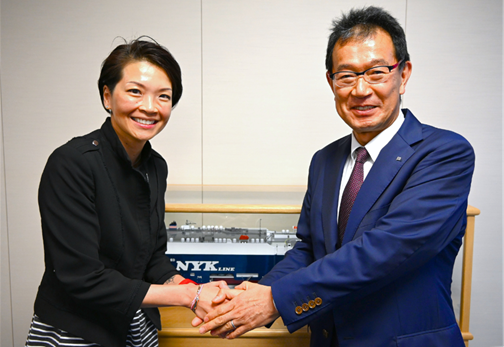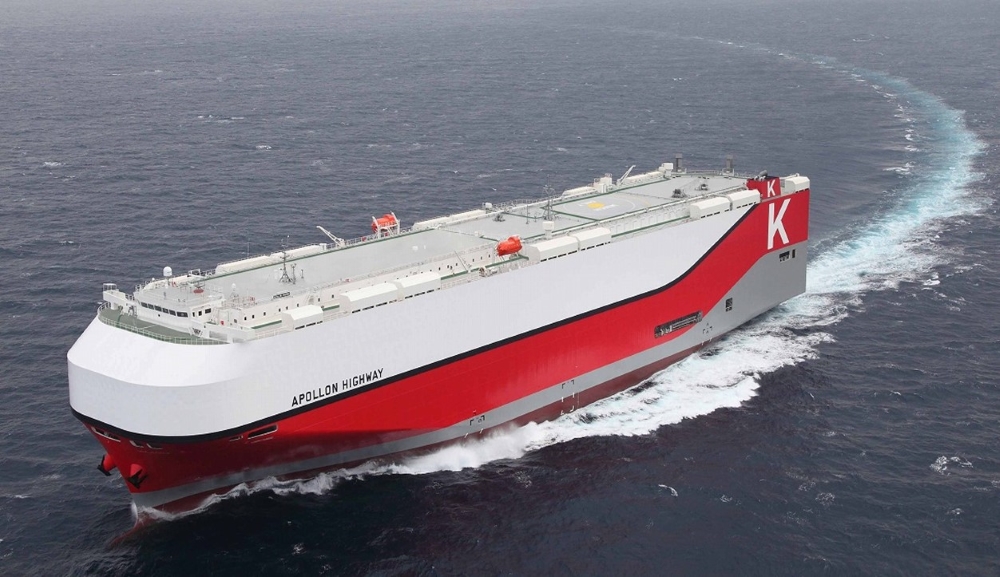
〆NS United Kaiun Kaisha, Ltd. will use methanol fuel for its Capesize vessels, while NYK Line and K Line are set to employ biofuels in their car carriers.
Japanese shipping companies are increasingly building new vessels that use alternative fuels and are enhancing collaborations with overseas firms to employ biofuels.
NS United Kaiun has signed a memorandum of understanding (MOU) with Nihon Shipyard (NSY), Imabari Shipbuilding, and Japan Marine United Corporation (JMU) to construct several methanol dual-fuel Capesize bulk carriers. These new vessels, each with a deadweight tonnage of 209,000, are next-generation environmentally friendly ships. They are expected to be completed and enter service after 2027, with all ships projected to be deployed for transporting raw materials for domestic and international steel companies.
The new vessel design will pre-emptively comply with the Phase 3 Energy Efficiency Design Index (EEDI) regulations for new bulk carriers, which are to be contracted from 2025 onwards. In addition to conventional heavy fuel oil, the new design will feature dual-fuel engines capable of operating on methanol, a fuel with lower environmental impact.
NS United Kaiun anticipates that by using green methanol derived from renewable energy sources rather than fossil fuels, they will achieve over an 80% reduction in greenhouse gas (GHG) emissions compared to heavy fuel oil.

NYK Line, in collaboration with the Global Centre for Maritime Decarbonisation (GCMD), a non-profit organisation based in Singapore focused on decarbonising the maritime industry, has launched “Project LOTUS” to address the challenges of long-term biofuel usage. This project involves the continuous use of biofuel for six months on NYK Line’s car carriers. The evaluation of NYK Line’s car carriers will scrutinise the impact on engine performance and fuel supply systems.
Meanwhile, K Line has conducted its first trial voyage using 100% biodiesel fuel, known as “B100.” The company has signed a supply contract for B100 with World Fuel Services, a major fuel supplier in the United States. The trial was carried out on K Line’s car carrier, “APOLLON HIGHWAY,” from the end of March to the end of April 2024.
What do the moves of Japan’s major operators towards new fuels signify?
Capesize vessels are used for transporting steel raw materials. Both Japanese and international steel manufacturers are currently working to reduce their carbon dioxide emissions. Many steel manufacturers are transitioning from carbon-intensive blast furnaces to electric arc furnaces that use steel scrap.
Car carriers are used for automobile transportation. Japanese automakers are among the most forward-thinking companies regarding environmental issues. In fact, NYK Line is using LNG fuel for all its new vessels, and K Line is also advancing the adoption of LNG fuel for its car carriers.
Both NYK Line and K Line are using biofuels on their car carriers. Biofuels are considered a significant means of reducing greenhouse gas (GHG) emissions during the transition from heavy fuel oil to zero-emission fuels, as they can be used with existing marine engines and fuel supply systems.
Over the past decade, the shipping industry has conducted various biofuel trials during actual voyages, primarily focusing on fuel properties and GHG emission reduction effects. However, the impact of long-term continuous use of biofuels has not been thoroughly examined.

In late March 2024, K Line supplied marine B100 biofuel to its vessel “APOLLON HIGHWAY” at the port of Zeebrugge, Belgium. The APOLLON HIGHWAY began its trial voyage after departing the European Emission Control Area (ECA) and completed the trial on April 30, 2024.
Biofuels are an alternative fuel capable of reducing environmental impact and can be used without modifying existing diesel engines on ships. Compared to traditional fossil fuels, biofuels can achieve about an 80-90% reduction in CO2 emissions over their lifecycle, from raw material cultivation to final fuel use.
The B100 biofuel used by K Line in this instance is derived from renewable organic resources such as biomass, avoiding the use of raw materials that compete with food or feed.
Japanese shipping companies consistently engage with cargo owners on environmental issues, working towards reducing greenhouse gas emissions from ships and adopting new fuels.
〆日本のオペレーター各社はメタノール燃料船の建造、バイオ燃料で海外企業との連携を相次ぎ強化している。
〆NS United Kaiun Kaisha, Ltd.はケープサイズにメタノール燃料を使用する。NYK LineとK Lineは自動車専用船にバイオ燃料を使用する。
日本の海運会社が相次ぎ新燃料を使用する新造船の建造やバイオ燃料を使用するために海外企業との連携を強化している。
NS United KaiunはNihon Shipyard(NSY)、Imabari Shipbuilding、Japan Marine United Corporation(JMU)と4社間で、メタノール2元燃料ケープサイズバルカーを複数隻建造することに関する覚書(MOU)を結んだ。新船型は20万9000重量トン型の次世代環境対応船である。竣工は2027年以降の就航を目指す。全船ともに国内外の鉄鋼会社向け原料輸送に配船される見通しだ。
新船型は、2025年以降に建造契約を結ぶばら積み貨物船に適用される新造船燃費規制EEDI(エネルギー効率設計指標)フェーズ3を先行して適用する。従来型の重油燃料に加えて、新船型は環境負荷の低いメタノール燃料を使いながら航行できる2元燃料エンジンを搭載する。
NS United Kaiun化石燃料由来ではなく再生可能エネルギー由来のグリーンメタノールを使用することで、重油に比べて80%超のGHG(温室効果ガス)排出削減効果が見込んでいる。
NYK Lineはシンガポールを拠点に海事産業の脱炭素化を目指す非営利団体「グローバルセンター・フォー・マリタイム・デカーボナイゼーション」(GCMD)と共同で、バイオ燃料の長期使用の課題を検証する「プロジェクトLOTUS」を開始した。NYK Lineが運航する自動車専用船でバイオ燃料を6カ月間継続使用する。NYL Lineの自動車船を検証することで、エンジン性能や燃料供給システムに与える影響を精査する。
一方、K Lineは同社初となるバイオディーゼルを100%用いたバイオ燃料「B100」の試験航行を実施した。米国の燃料供給大手World Fuel ServicesとB100の供給契約を締結した。K Lineが運航する自動車船「APOLLON HIGHWAY」に2024年3月末から4月末にかけて試験航行を実施した。